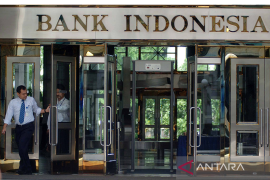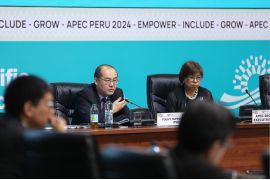Indeed, many believe the Indonesian economy will expand by more than 6 percent this year due to strong domestic consumption and an inflow of large investments. However, this economic growth will fall short of the target of 6.5 percent, due to decreased exports.
The Central Statistics Agency (BPS) said the domestic economy grew by 6.3 percent in the first quarter of 2012 on a year-on-year basis, or 1.4 percent on a quarter-to-quarter basis, with the farming, forestry, and fishery sectors being the top contributors to the growth, with 20.9 percent.
Yet, the nation missed its economic growth target of 6.5 percent for the first quarter of 2012 by 0.2 percent.
Of note, the Indonesian economy surprisingly picked up 6.4 percent in the second quarter of this year, fueled by strong domestic consumption and investment. The high growth in the quarter ending June 2012 suggested that Indonesia remained resilient, in spite of global financial woes.
At the same time, the domestic economy fell to a two-year low of 6.17 percent for the quarter ending September 2012 due to low demand from the nation's major trade partner, China.
According to the BPS, the third-quarter growth was boosted by a hike in fixed gross capital formation by 10.02 percent and household consumption expenditures of 5.68 percent.
Further, the largest quarter-to-quarter growth in the third quarter was recorded in the agricultural sector at 6.15 percent, due especially to a 23.43 percent hike in the agriculture sub-sector.
"The figures show our agricultural sector made a significant improvement from 2.34 percent in the second quarter, following abundant harvests," BPS chief Suryamin said.
The growth in the GDP in the third quarter was contributed mostly by the transportation and communication sector that grew 10.48 percent.
The communication sector, however, was more dominant, including internet and cell phone telecommunication service industries, he said.
Suryamin said the third quarter`s largest source of cumulative economic growth from the second quarter was the processing industries, ranging from 1.62 percent to 6.36 percent.
"The number shows our industrial sector has been able to increase the variety of its products and exploit the domestic market potential," he said
Finance Minister Agus Martowardojo predicted that the domestic economy will grow by 6.3 percent this year, slightly lower than the target of 6.5 percent set in the revised 2012 state budget.
"If fourth-quarter growth is to reach 6.3 percent, this means that full-year growth will be 6.3 percent, a level that we are most likely to achieve," he said.
Even the domestic economy is expected to grow 6.2 percent by the end of this year if fourth-quarter growth is below the range target of 5.9 to 6.3 percent, the minister said.
Indonesia`s central bank predicted the full-year economic growth would reach 6.3 percent this year, fueled by high domestic consumption. Overall, the Indonesian economy in 2012 and 2013 is predicted to expand 6.1 to 6.5 percent and 6.3 to 6.7 percent, respectively, Bank Indonesia Governor Darmin Nasution said.
In its evaluation of the Indonesian economy, the bank`s board of governors said the domestic economy is expected to grow at a high pace this year, although the growth will not be as high as expected.
However, officials at Asian Development Bank (ADB) project Indonesia`s economic growth by the end of 2012 will be below 6.4 percent, or lower than April`s forecast of 6.4 percent.
Senior economist of ADB in Indonesia, Edimon Ginting, said the country`s economic growth is projected to be lower due to the decreased contribution of exports, investments, private consumption and government spending, which supports the nation's economy.
Additionally, economic growth is expected to fall short of the target of 6.5 percent for this year due to the decreased contribution of exports. This decline in exports is the result of an economic slowdown in the main market for Indonesian exports.
The Central Statistics Agency (BPS) said total exports in the nine months to September 2012 fell 6.06 percent to US$143 billion from the same period last year. Total exports in the January-September 2012 period accounted for 70.44 percent of the government-set target of US$203 billion for this year.
In contrast, imports during the year to September rose 9.18 percent to US$141.97 billion from one year earlier. Consequently, Indonesia recorded a trade deficit for the fourth straight month in a row in July 2012.
Indonesia`s trade with foreign countries reported a deficit of US$641.1 million in April, US$$489.5 million in May, US$1.33 billion in June and US$176.5 million in July. The country recorded a trade surplus of US$248.5 million in August and US$552.9 million in September.
The increase in imports is particularly attributable to high demand for capital goods in line with strong investment.
Vice Trade Minister Bayu Krisnamurthi said the import of capital goods grew 28.6 percent in the first eight months of 2012, compared to the same period one year earlier. Meanwhile, the import of raw materials grew 6.9 percent during the same period.
(S012/KR-BSR/H-YH)
Reporter: Suharto
Editor: Jafar M Sidik
Copyright © ANTARA 2012











